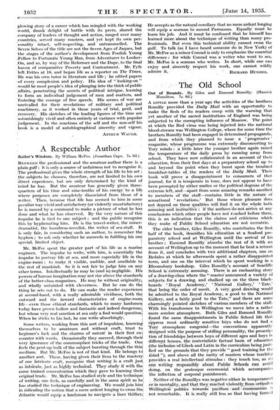A Respectable Author
Sailor's Wisdom. By William MeFee. (Jonathan Cape. 7s. 6d.) BETWEEN the professional and the-amateur author there is a .plain gulf : it is only a source of unfairness not to recognize it., The professional gives the whole strength of his life to his art ; the subjects he chooses, therefore, are not limited to his own direct experience, but are only determined by the kind of imind he has. But the amateur has generally given, three- -quarters of his time and nine-tenths of his energy to a life -where purposes are completely dissociated from those of a writer. Then, because that life has seemed to him in some peculiar way vivid and satisfactory (or violently unsatisfactory) he is moved by a command to make a picture of what he has done and what he has observed. By the very nature of this impulse he is tied to one subject ; and the public recognize this by hyphenating him. He is the travel-writer, the miner= dramatist, the laundress-novelist, the writer of sea-stuff. It is only fair, in considering such an author, to remember the hyphen ; to ask only whether he succeeds in fulfilling his one special, limited object.
Mr. McFee spent the greater part of his life as a marine engineer. The impulse to write, with him, is essentially the impulse to portray life at sea, and more especially life in the engine-room : to make it visible, audible, and smellable to the rest of mankind. So it is not fair to judge him on any other terms. Intellectually he may be (and is) negligible. His powers of human imagination may not rise above the standards of the better-class.magazines. He may be without originality; and wholly untainted with cleverness. But he can do the thing he sets out to do. He can make the reader experience at second-hand, with a really admirable vividness, both the outward and the inward characteristics of engine-room life—even those ethical standards, which to many landsmen, today have grown hollow and fantastic and indeed dangerous,i but whose very real sanction at sea only a fool would questionil When he sticks to his last, he can write absorbingly.
Some writers, working from this sort of impulsion, knowing themselves to be amateurs and without craft, trust to beginner's luck and the charms of naivete in their first en-: counter with words. Occasionally they succeed, through their very ignorance of the commonplace tricks of the trade. One feels the pent-up bulk of the subject bursting through the thii medium. But Mr. McFee is not of that kind. He belongs to another sort. These, having given their lives to the masterY, of one intricate craft, recognize that writing is a craft just as intricate, just as highly technical. They study it with the same trained concentration which they gave to learning their original trade. Mr. McFee has studied style and the technique! of writing, one feels, as carefully and in the same spirit as he! has studied the technique of engineering. We would join him in ridiculing the notion that a mere ardent longing to -cross the Atlantic would equip a landsman to navigate a liner thither.; He accepts as the natural corollary that no mere ardent longing will equip a seaman to ascend Parnassus. Equally must he learn his job. And it must'be confessed that he himself has learned more about the teChnique of Writing than many pro- fessionals. But even this technical ability cannot cross the gulf. To talk iaS I haVe heard someone do in New York) of Mr. McFee as Hminor Conrad is only to emphasize the essential difference : for while Conrad was a writer who went to sea, Mr. McFee is a seaman .who writes. In short, while one can enjoy and sincerely respect his work, one cannot wildly


















































 Previous page
Previous page